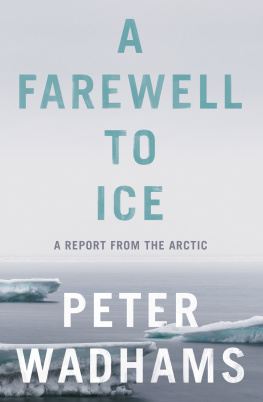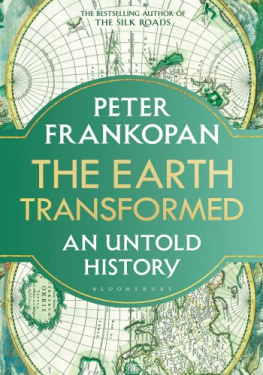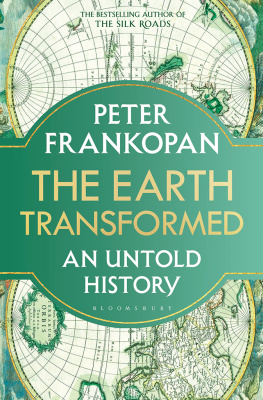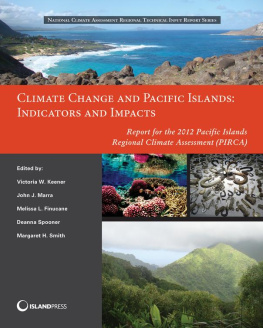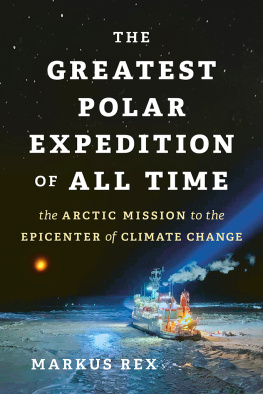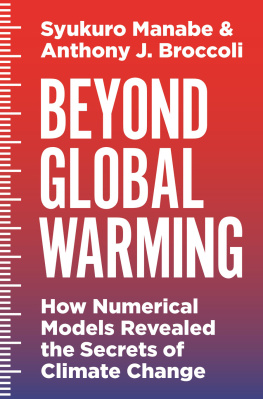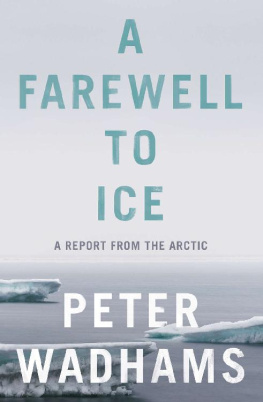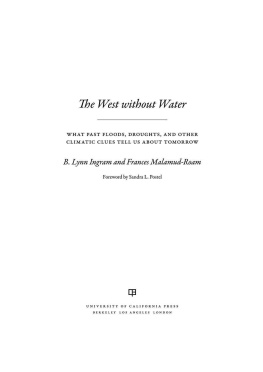Peter Wadhams
A FAREWELL TO ICE
with a Foreword by Walter Munk
ALLEN LANE
UK | USA | Canada | Ireland | Australia
India | New Zealand | South Africa
Allen Lane is part of the Penguin Random House group of companies whose addresses can be found at global.penguinrandomhouse.com
First published 2016
Copyright Peter Wadhams, 2016
The moral right of the author has been asserted
Cover photograph Greg White/Webber Represents
Cover design: Leo Nickolls
ISBN: 978-0-241-00942-0
In memory of old Arctic friends
Bill Campbell
Max Coon
Norman Davis
Moira and Max Dunbar
Geoff Hattersley-Smith
Wally Herbert
Lyn Lewis
Ray Lowry
Nobuo Ono
Erkki Palosuo
Gordon Robin
Unsteinn Stefnsson
Charles Swithinbank
Norbert Untersteiner
Thomas Viehoff
List of Plates
Every effort has been made to contact all copyright holders. The publishers will be happy to make good in future editions any errors or omissions brought to their attention.
List of Figures
1.1
2.1
2.2
2.3
3.1
4.1
4.2
4.3
5.1
5.3
5.4
5.5
6.1
6.2
7.1
7.2.
7.3
8.1
8.2
8.3
8.4
9.1
11.1
12.1
12.2
12.3
Every effort has been made to contact all copyright holders. The publishers will be happy to make good in future editions any errors or omissions brought to their attention.
Acknowledgements
I am grateful to innumerable people who have helped with facts, ideas and inspirations. They include Paul Beckwith, Peter Carter, Florence Fetterer, Martin Harrison, Chris Hope, Charles Kennel, Daniel Kieve, Seelye Martin, Walter Munk, Jon Nissen, Jim Overland, Hans Joachim Schellnhuber, David Wasdell and Gail Whiteman. I am grateful to Carl Wunsch, David Wasdell and Subhankar Banerjee for reading the whole manuscript and suggesting valuable additions and changes. I thank the US Office of Naval Research for long-term scientific support which made this book possible; also Andrea Pizzuti of Grafiche Fioroni, Casette dEte (Fermo), Italy, for help with illustrations. Most of all I thank my wife, Maria Pia Casarini, Director of the Istituto Geografico Polare Silvio Zavatti, Fermo, Italy, for a lifetime of personal support and inspiration.
I have named this book A Farewell to Ice (with apologies to Ernest Hemingway) because it deals not only with the implications for our planet of the huge loss of sea ice which is currently occurring, but also interleaves it with some personal stories from a long career which I hope shed light on the special nature of the world of sea ice and the consequences of its disappearance.
draws on a review originally published as Antarctic Sea Ice Changes and their Implications: The Annual Ice Cycle and its Changes, in Climate Change: Observed Impacts on Planet Earth, 2nd edition, ed. Trevor Letcher (Amsterdam: Elsevier, 2015).
Foreword
Peter Wadhams has been a polar researcher for forty-seven years, during which time he has observed and measured major changes in the nature of sea ice cover in the polar regions. In this book, he first gives a brief review of the planet and the development of its ice on land and sea. He goes on to describe the profound transformations that he has witnessed during his career. The area of Arctic sea ice in summer has dwindled from more than 8 million square kilometres to less than half that, leading to projections for the imminent occurrence of ice-free summers.
The melting of sea ice is not just a curious phenomenon in a remote part of our world: it sharply decreases the amount of solar radiation reflected back into space, from 60 per cent to 10, further accelerating the planetary warming cycle. Frozen sediments, which have lain undisturbed since the last Ice Age, are now releasing plumes of methane a very potent greenhouse gas into the atmosphere. A Farewell to Ice is both an authoritative report on the state of the Arctic today and a timely reminder of the global threat posed by the loss of its sea ice.
Walter Munk
Scripps Institution of Oceanography, La Jolla, California
1
Introduction: A Blue Arctic
I have been a polar researcher since 1970. For most of those years I had the privilege of being based at the Scott Polar Research Institute in Cambridge, and served as its Director. Established as a memorial to Captain Robert Falcon Scott, it was a haven and meeting place for polar researchers of every kind of discipline, many of whom took long leaves of absence from their host institutions to study in its incomparable library. Throughout the 1970s and 1980s I was in the polar regions (usually the Arctic) every year, sometimes several times, and, like my colleagues in Europe, America, Russia and Japan, devoted myself to understanding the basic physical processes which occur in sea ice and which determine how it grows, decays and moves. Field research into ice is very difficult, and at times dangerous, and few of us considered that the object of our efforts, the Arctic Ocean, could be changing before our eyes. It was hard enough trying to understand how the Arctic worked in the first place. Yet changing it was. I was fortunate enough to be one of the first to obtain definite evidence of this, when I compared surveys of ice thickness that I had made from submarines in 1976 and 1987 and found a 15 per cent loss of average thickness. This result, published in Nature in 1990, Something truly dramatic was going on. Polar researchers raised their eyes from their own specialized studies and started to consider the larger picture. They have become climate change specialists, indeed climate change pioneers, since it is in the Arctic that global change appears to be most rapid and drastic.
), and eventually, when we were in the middle of the Northwest Passage, we had to be rescued by a heavy Government icebreaker, the John A. Macdonald. In those days, a battle with sea ice in the Canadian Arctic was considered normal. In 19036 it took Amundsen three years to navigate the Northwest Passage, and the second ship to make the Passage, the Royal Canadian Mounted Police schooner St. Roch, needed two seasons in 19424.
Today a ship entering the Arctic from Bering Strait in summer finds an ocean of open water in front of her. This blue water extends far to the north, stopping not far short of the North Pole. By the time this book is published it is possible and, according to many predictions, likely that the Pole itself will be uncovered for the first time in tens of thousands of years. The Northwest Passage is now easily navigable, and by the end of 2015 a total of 238 ships had sailed through it. In September 2012 sea ice covered only 3.4 million square kilometres (km2) of the Arctic Oceans surface, down from 8 million km2 in the 1970s. It is difficult to overstate what this means in terms of planetary change. Our planet has actually changed colour. We all remember the first beautiful photograph of planet Earth rising from behind the Moon, taken by the Apollo-8 astronauts, a delicate blue sphere, isolated in the cosmos, which contains all that we know of life. That sphere was white at both ends. Today, from space, the top of the world in the northern summer looks blue instead of white. We have created an ocean where there was once an ice sheet. It is Mans first major achievement in reshaping the face of his planet, and it is of course an unintended achievement, with dubious and possibly catastrophic consequences to follow.

